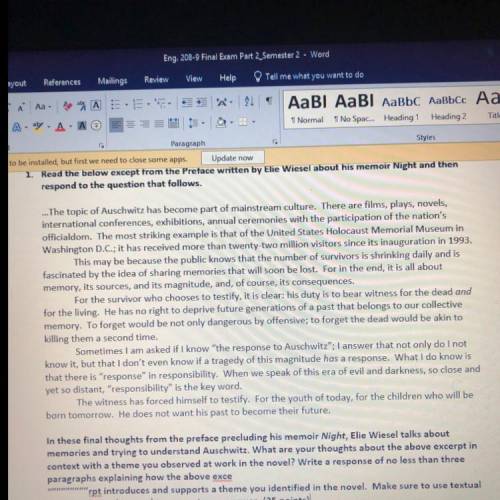
1. Read the below except from the Preface written by Elie Wiesel about his memoir Night and then
respond to the question that follows.
... The topic of Auschwitz has become part of mainstream culture. There are films, plays, novels,
international conferences, exhibitions, annual ceremonies with the participation of the nation's
officialdom. The most striking example is that of the United States Holocaust Memorial Museum in
Washington D. C.; it has received more than twenty-two million visitors since its inauguration in 1993.
This may be because the public knows that the number of survivors is shrinking daily and is
fascinated by the idea of sharing memories that will soon be lost. For in the end, it is all about
memory, its sources, and its magnitude, and, of course, its consequences.
For the survivor who chooses to testify, it is clear: his duty is to bear witness for the dead and
for the living. He has no right to deprive future generations of a past that belongs to our collective
memory. To forget would be not only dangerous by offensive; to forget the dead would be akin to
killing them a second time.
Sometimes I am asked if I know "the response to Auschwitz"; I answer that not only do I not
know it, but that I don't even know if a tragedy of this magnitude has a response. What I do know is
that there is "response" in responsibility. When we speak of this era of evil and darkness, so close and
yet so distant, "responsibility” is the key word.
The witness has forced himself to testify. For the youth of today, for the children who will be
born tomorrow. He does not want his past to become their future.
In these final thoughts from the preface precluding his memoir Night, Elie Wiesel talks about
memories and trying to understand Auschwitz. What are your thoughts about the above excerpt in
context with a theme you observed at work in the novel? Write a response of no less than three
paragraphs explaining how the above exce
'rpt introduces and supports a theme you identified in the novel. Make sure to use textual
evidence from the novel to support your answer. (25 points)


Answers: 3
Another question on English

English, 22.06.2019 01:30
Read the passage. and thus they fought all the long day, and never stinted till the noble knights were laid to the cold earth. and ever they fought still till it was near night, and by then was there a hundred thousand laid dead upon the down. in the passage from morte d’arthur by sir thomas malory, what are the bolded words an example of?
Answers: 1

English, 22.06.2019 04:20
Lens quotation: "character is what you are in the dark." -dwight lyman moody
Answers: 1

English, 22.06.2019 05:30
How does mercutio, in romeo and juliet, convey his anger before dying?
Answers: 1

English, 22.06.2019 06:00
4. how does the speaker's comparison of sinners to aninsect (paragraph 7) contribute to the central idea of thetext? o a it emphasizes the negative view god has ofsinners and how inconsequential they are to him.o b it stresses the connection that exists between allof god's creatures, whether they be human orinsect.o c it suggests that sinners can change for the better,as insects are known to go throughtransformations.o d it portrays sinners as being just as prevalentaround the earth as the wide variety of insects.
Answers: 1
You know the right answer?
1. Read the below except from the Preface written by Elie Wiesel about his memoir Night and then
re...
Questions

Mathematics, 23.08.2019 21:30

Mathematics, 23.08.2019 21:30

Biology, 23.08.2019 21:30

Physics, 23.08.2019 21:30


Social Studies, 23.08.2019 21:30




Mathematics, 23.08.2019 21:30



History, 23.08.2019 21:30

English, 23.08.2019 21:30

Arts, 23.08.2019 21:30

History, 23.08.2019 21:30


History, 23.08.2019 21:30

Mathematics, 23.08.2019 21:30



